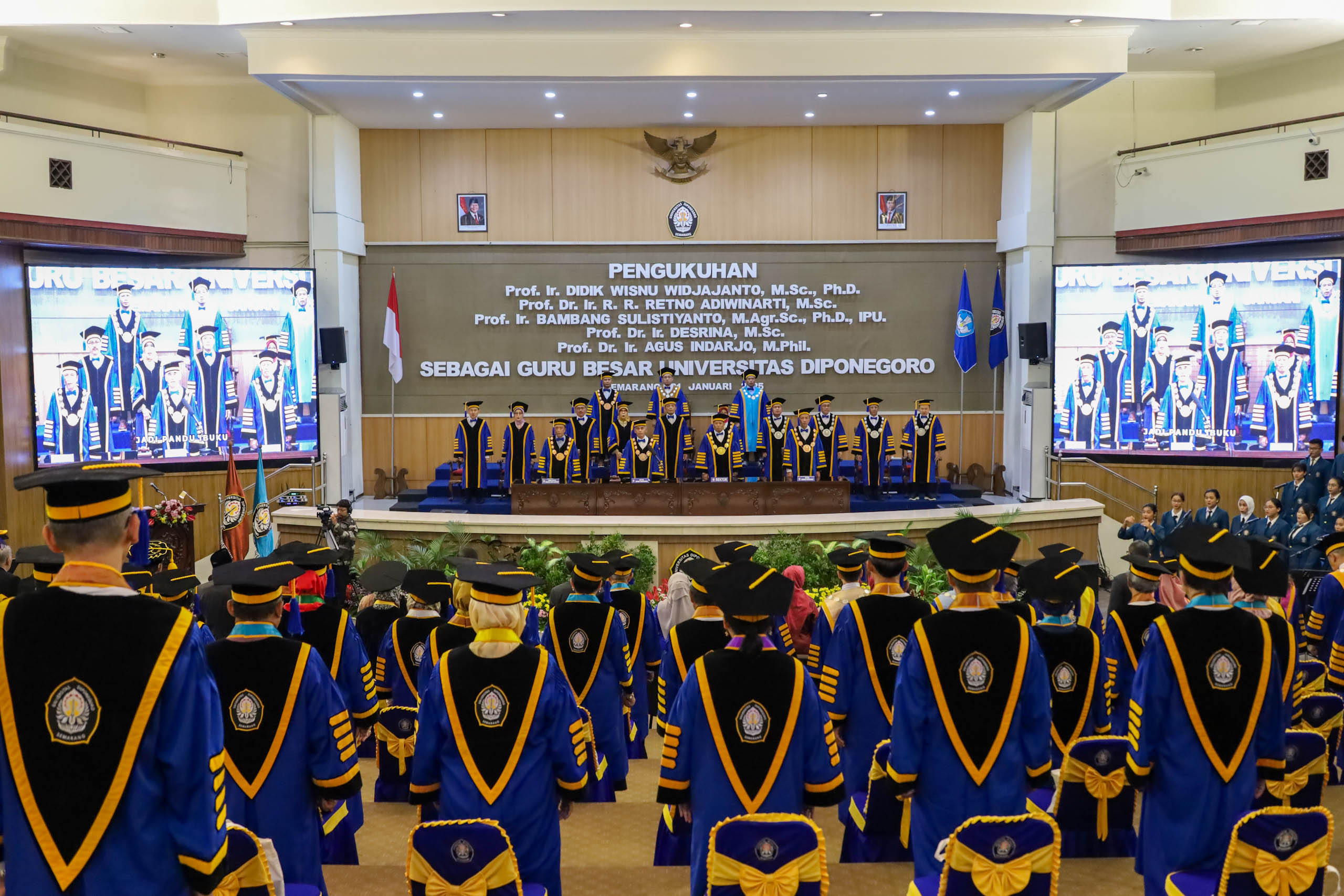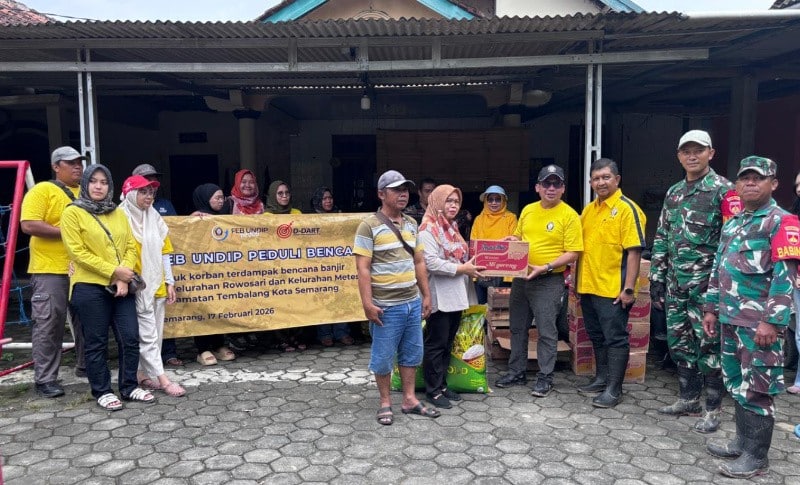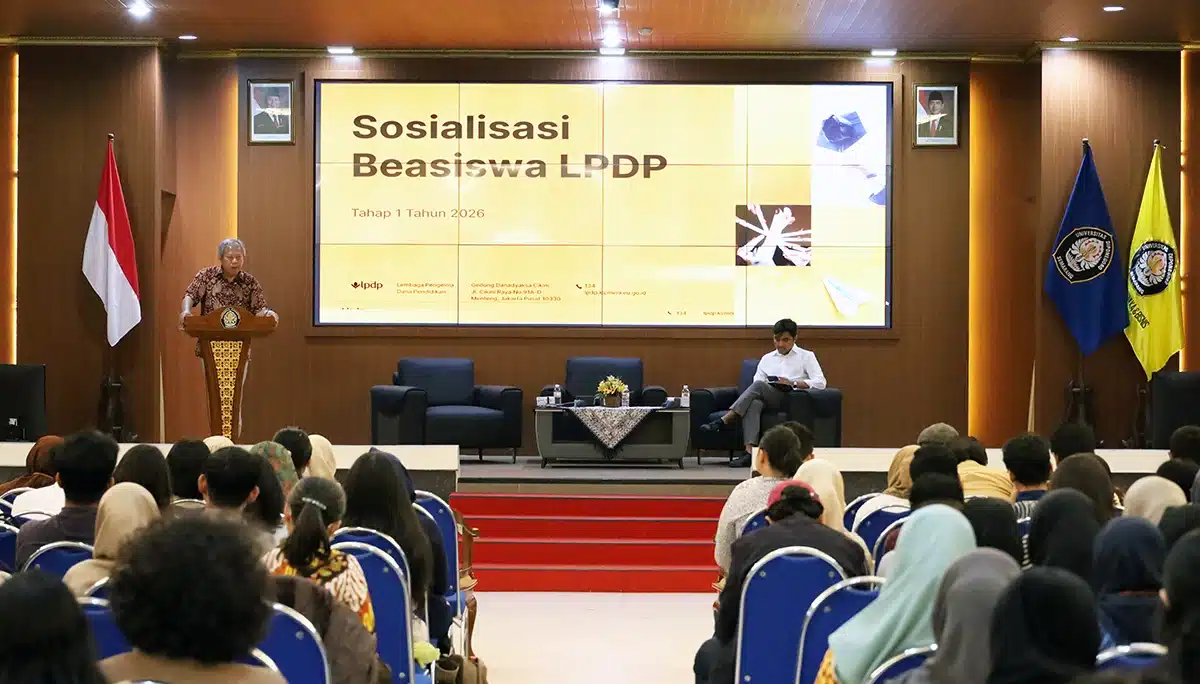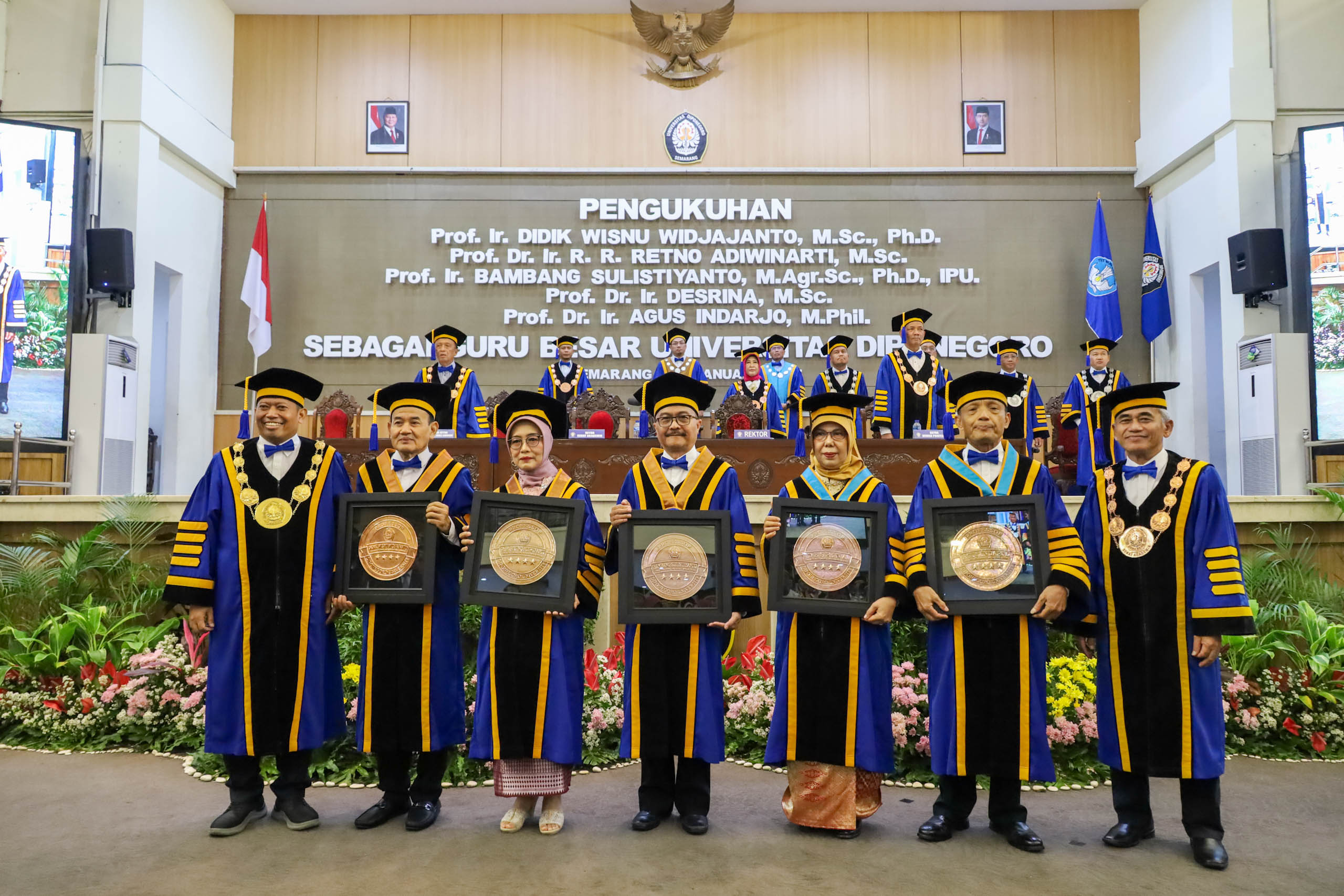UNDIP, Semarang (21/01) – Universitas Diponegoro (UNDIP) today inaugurated five professors as part of a series of ceremonies for the inauguration of 36 professors at UNDIP, taking place from late January to early February 2025.
The five professors inaugurated today include three from the Faculty of Animal and Agricultural Sciences, namely Prof. Ir. Didik Wisnu Widjajanto, M.Sc., Ph.D.; Prof. Dr. Ir. R.R. Retno Adiwinarti, M.Sc.; and Prof. Ir. Bambang Sulistiyanto, M.Agr.Sc., Ph.D., IPU. Two others are from the Faculty of Fisheries and Marine Sciences; they are Prof. Dr. Ir. Desrina, M.Sc., and Prof. Dr. Ir. Agus Indarjo, M.Phil.
Each professor presented their research findings and innovations during the ceremony. Prof. Ir. Didik Wisnu Widjajanto, M.Sc., Ph.D., an expert in the Organic Agriculture field, conveyed the material titled “The Application of Organic Agriculture in Enhancing Land Productivity to Support Food Security.” Prof. Didik emphasized that intensive farming reliant on excessive chemical inputs leads to soil degradation and environmental harm. He advocated for organic farming techniques utilizing organic materials, enriched organic fertilizers, and bio-fertilizers to improve soil fertility, sustain productivity, and support food security.
“The implementation of Organic Farming (OF) using organic materials, organic fertilizers, enriched organic fertilizers, and bio-fertilizers has proven effective in improving soil fertility, maintaining and enhancing the productive lifespan of land and crops, as well as supporting food security,” stated Prof. Didik.
Prof. Dr. Ir. R.R. Retno Adiwinarti, M.Sc., an expert in the field of Livestock Production Management, presented “Improving the Productivity of Small Ruminants Through Feed Enhancement and Animal Welfare.” Prof. Retno explained that farmers who raise goats and sheep traditionally through grazing (extensive systems) promote animal welfare and produce healthier meat. However, growth tends to be slower due to insufficient feed. With the decline in grazing land, farmers are increasingly shifting to intensive systems, which require greater attention to feed, water, and space for movement.
Alternative feed sources, such as Gliricidia leaves, can be utilized as a protein source in combination with concentrate feed containing soybean meal. Additionally, complete feed in the form of pellets is more efficient in increasing feed intake compared to mash (fine) feed, thus improving animal welfare and reducing methane gas emissions.
Prof. Ir. Bambang Sulistiyanto, M.Agr.Sc., Ph.D., IPU., an expert in the field of Functional Feed for Non-Ruminant Livestock, brought the topic “Utilization of Fermentation Technology in Developing Functional Feed for Poultry to Support Smallholder Farming.” The increasing demand for livestock-derived food that is Safe, Healthy, Wholesome, and Halal (Aman, Sehat, Utuh, dan Halal / ASUH) has encouraged the poultry industry to seek alternative feed options following the ban on growth-promoting additives such as hormones and antibiotics. Natural functional feed additives, including plant extracts, antioxidants, probiotics, prebiotics, mycotoxin binders, enzymes, and phytogenic or phytobiotic compounds, have become solutions to meet the nutritional and health needs of livestock.
Feed processing technologies to support the provision of alternative feeds, including feed additives and fermented products, have proven effective in addressing environmental and feed-related challenges. The application of fermentation technology in processing vegetable and fruit waste can produce alternative feeds with good physical, organoleptic, and microbiological properties and utility, serving as a source of probiotics. Additionally, enriching fermented vegetable waste with garlic waste can yield feed materials rich in probiotic bacteria and the phytogenic compound allicin, potentially serving as natural synbiotics beneficial for poultry growth.
“This success demonstrates that fermentation technology plays a significant role in providing functional alternative poultry feed, which will greatly help address the challenge of increasing livestock productivity in smallholder farming in the post-antibiotic growth promoter era,” explained Prof. Bambang Sulistiyanto.
Prof. Dr. Ir. Desrina, M.Sc., who has expertise in Aquatic Organism Diseases, delivered a presentation, “Holistic Disease Control Strategies for Sustainable Aquaculture in Indonesia.” Prof. Desrina explained that controlling aquaculture diseases is not merely about eliminating pathogens from aquaculture sites but requires a holistic approach. This process includes understanding pathogen ecology both inside and outside the host, the interactions between host, pathogen, and environment within and beyond the aquaculture system, and considering environmental carrying capacity.
A holistic strategy, combining existing methods (bio-security) with an emphasis on understanding pathogen ecology, will effectively control aquaculture diseases in the future, paving the way for achieving sustainable aquaculture in Indonesia.
Prof. Dr. Ir. Agus Indarjo, M.Phil, who has expertise in Marine Resource Management, conveyed the topic “Marine Resource Management Based on Coastal Cleanup Information Systems and Biosensor Technology.” Marine resources provide various ecosystems that support life, including biodiversity, food sources, and climate regulation. However, these resources face challenges such as pollution, overfishing, and climate change, which threaten the balance of marine ecosystems.
To address these issues, the Coastal Cleanup Information System (SICC) and the Bio-Cell-GSM innovation, later enhanced into Bio-Cell-LoRa, are essential. The management approach utilizing SICC, Bio-Cell-GSM, and Bio-Cell-LoRa offers several advantages, such as real-time monitoring, comprehensive and accurate data collection, and the preservation of marine ecosystem balance. This effort ensures the sustainability of marine resources is maintained more effectively.











